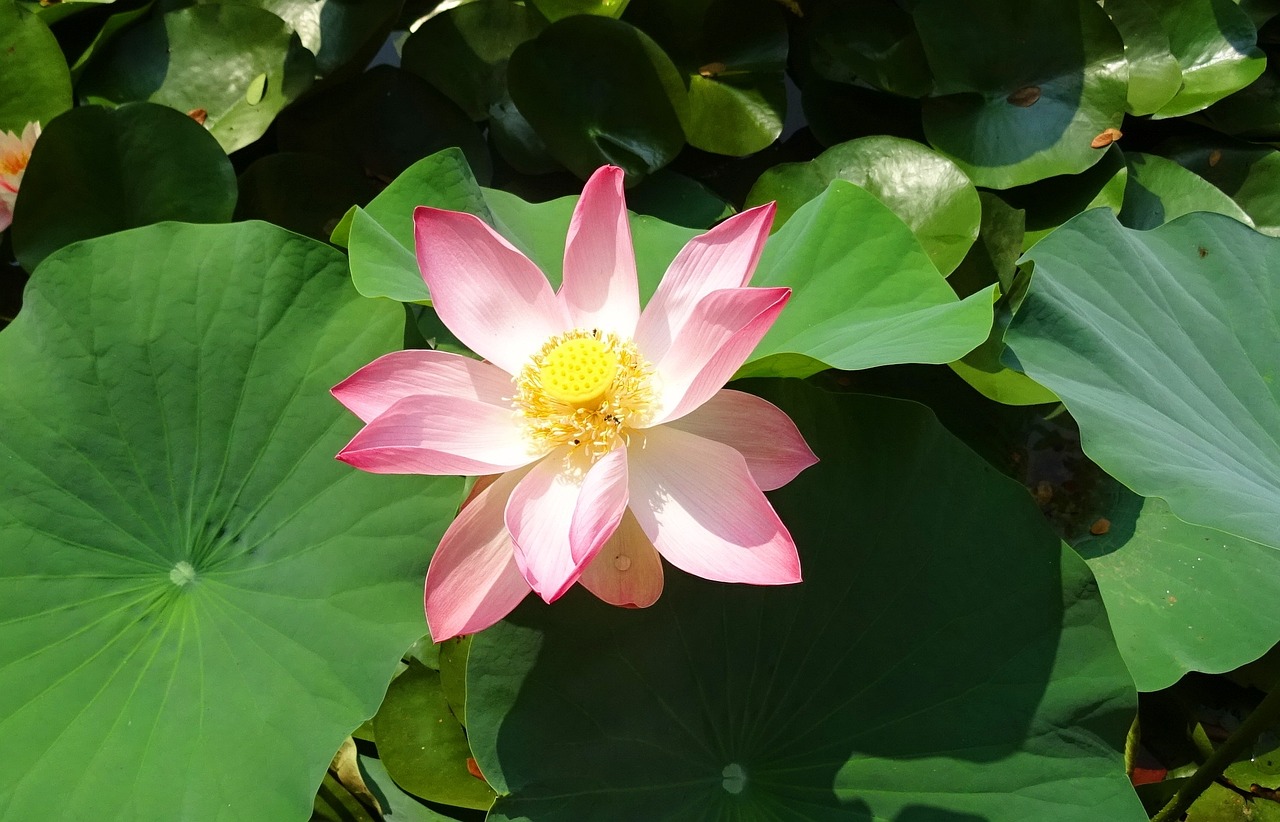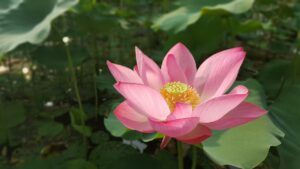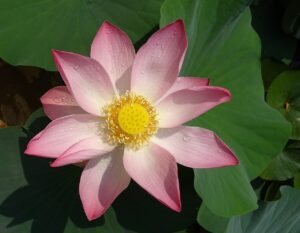Sacred Lotus (Nelumbo nucifera)
Overview
The Nelumbo nucifera, or Sacred Lotus, is an aquatic plant celebrated in Asian cultures for its spiritual and medicinal qualities. Revered in Hinduism and Buddhism for symbolizing purity and enlightenment, it also serves practical purposes—in traditional remedies and as an ornamental plant. Containing various bioactive compounds, the Sacred Lotus may offer health benefits, like improving digestion and boosting liver function. Some use its leaves and flowers for smoking, seeking relaxation and mild euphoria, though effects and legalities vary. Caution is advised due to limited research on safety and efficacy.
Common name(s): Indian Lotus, Bean of India, Egyptian Bean
Scientific name: Nelumbo nucifera

Characteristics
Known for its cultural significance in Asian religions, traditional medicinal use, and distinctive aquatic flowering presence.
Region
Native to tropical regions of Asia and Australia.
Natural Habitat
Sacred Lotus is typically found in ponds, lakes, and other shallow aquatic environments.
Cultivation
Requires full sun, a warm climate, still water conditions, and a deep, rich loam soil.
Traditional Usage
The Sacred Lotus has played an integral part in traditional medicine, offering a variety of health benefits and serving as a symbol of purity and spiritual growth in various cultures. Here are some of the traditional uses of the Sacred Lotus:
- Digestive health: It’s been used to treat gastrointestinal issues.
- Bleeding disorders: The plant has properties that help manage bleeding conditions.
- Skin health: Used to improve and treat skin conditions.
- Religious ceremonies: The flowers are incorporated in spiritual practices.
- Herbal teas: Made from flowers for their soothing effects.
In addition to these uses, Sacred Lotus is appreciated for its edible seeds, roots, and leaves, contributing to its versatile application in everyday life.
Historical Usage
Revered in Asian spiritual traditions and used in ancient medicine for digestive, skin, and bleeding disorders.
Common Usage
Cultivated as an ornamental plant, used for edible seeds, roots, leaves, and in herbal teas, and incorporated in religious ceremonies.
Effects
The Sacred Lotus, traditionally revered in various cultures, is known for its soothing properties that promote a sense of calm and relaxation. Integrating this herb into a routine can help reduce stress and enhance one’s sense of well-being. Researchers have found that components within the Sacred Lotus can have a mild sedative effect, assisting in better sleep for those who consume it.
Beyond its calming effects, the Sacred Lotus is also associated with cognitive benefits. It’s believed to help improve memory and concentration, making it a valuable addition for those looking to support their mental acuity.
The following points highlight the general effects of the Sacred Lotus:
- Enhances relaxation and reduces stress
- May have a mild sedative effect aiding in better sleep
- Supports cognitive functions such as memory and focus
While the Sacred Lotus is often celebrated for its beauty, its potential health benefits are also noteworthy. For individuals seeking a natural avenue to unwind and sharpen their mind, this herb might offer a suitable remedy.1

Sacred Lotus: Celebrated for aiding in blood pressure regulation and serving as a source of valuable nutrients.
Effects when smoking
Smoking sacred lotus has gained attention for its soothing effects on the mind and body. People who use dried sacred lotus flowers or leaves for smoking often seek the following experiences:
- A gentle feeling of sedation, which may help in unwinding after a stressful day.
- The induction of euphoria, contributing to a state of well-being and happiness.
- Relaxation and stress relief, which are commonly sought after in herbal smoking blends.
The traditionally floral and slightly sweet qualities of the sacred lotus provide a pleasant flavor when smoked. To enjoy these effects, it is recommended to use the herb in a pipe or to roll it into cigarettes, starting with a modest amount and adjusting the dose as needed.
It is essential to stay mindful of your body’s reaction, as individual responses can vary, and there have not been established guidelines for the precise dosing when smoking this herb. As with any herbal remedy, those who are pregnant or breastfeeding should abstain, and everyone should consider the potential respiratory risks that come with smoking10.
While the plant carries a rich cultural history and potential health benefits, it’s vital to understand the legal standing in your locale and to consult with a healthcare professional if you plan to use sacred lotus for its medicinal properties9.
Flavor Profile
Slightly sweet and floral flavor profile.
Edible Parts
Seeds, roots, and leaves
Effects when Smoked
Reported to produce mild sedative and euphoric effects, promoting relaxation and stress relief when smoked.
User Experiences
User experiences with Sacred Lotus vary, with reports of relaxation and mild euphoria as well as occasional dizziness or nausea.
Medicinal Benefits
The Sacred Lotus, traditionally revered in various cultures, is known for its soothing properties that promote a sense of calm and relaxation. Integrating this herb into a routine can help reduce stress and enhance one’s sense of well-being. Researchers have found that components within the Sacred Lotus can have a mild sedative effect, assisting in better sleep for those who consume it.
Beyond its calming effects, the Sacred Lotus is also associated with cognitive benefits. It’s believed to help improve memory and concentration, making it a valuable addition for those looking to support their mental acuity.
The following points highlight the general effects of the Sacred Lotus:
- Enhances relaxation and reduces stress
- May have a mild sedative effect aiding in better sleep
- Supports cognitive functions such as memory and focus
While the Sacred Lotus is often celebrated for its beauty, its potential health benefits are also noteworthy. For individuals seeking a natural avenue to unwind and sharpen their mind, this herb might offer a suitable remedy.1
History and Folklore
Sacred lotus holds a venerable place across Asian traditions, symbolizing purity and spiritual awakening in religions like Hinduism and Buddhism. It has also anchored itself in the practices of Ayurveda and Traditional Chinese Medicine, where it has been applied as a remedy for digestive troubles, skin conditions, and hemorrhagic disorders. Its spiritual significance is echoed in ancient Egyptian culture as a symbol of rebirth, intimately connected to the sun god Ra.
These traditional uses span several millennia, underlining the plant’s enduring legacy in both medicinal and spiritual domains[2] [3].

Symbol of purity and rebirth, the Sacred Lotus is revered across various cultures for its spiritual significance and medicinal use.
Side Effects and Contraindications
While the Sacred Lotus is often considered safe in moderation, potential side effects include respiratory irritation from smoking, which can impact lung health. Some individuals may experience dizziness or nausea – these reactions can vary based on factors like dosage and personal sensitivity.
Specific populations, such as pregnant and breastfeeding women, should refrain from using Sacred Lotus due to a lack of safety data10.
Always consult a healthcare professional before using Sacred Lotus, especially for those with preexisting health conditions or concerns about interactions with other medications. Note that the legal status of smoking Sacred Lotus varies, so it’s crucial to be aware of local laws10.
Legal Status
In most countries, the cultivation, possession, and consumption of Sacred Lotus for ornamental, culinary, or traditional medicinal purposes are considered legal.
However, when it comes to using Sacred Lotus for smoking purposes, its legality may vary according to local laws and regulations specific to herbal smoking products. Before using Sacred Lotus in this manner, it is advisable to check your local regulations to ensure compliance.
References
1. Sou, S. Y., et al. “Sacred Lotus (Nelumbo Nucifera) – An Overview on Its Phytochemistry and Pharmacological Properties.” Phytotherapy Research, vol. 33, no. 10, 2019, pp. 2518-2530.
2. Saini, Ritu, et al. “Lotus: A Medicinal Crop with Its Roots in Religion and History.” Journal of Pharmacognosy and Phytochemistry, vol. 7, no. 2, 2018, pp. 1551-1556.
3. Mukherjee, Pulok K., et al. “The Sacred Lotus (Nelumbo Nucifera) – Phytochemical and Therapeutic Profile.” Journal of Pharmacy and Pharmacology, vol. 61, no. 4, 2009, pp. 407-422.
4. Paudel, Keshav Raj, and Nisha Panth. “Phytochemical Profile and Biological Activity of Nelumbo Nucifera.” Evidence-Based Complementary and Alternative Medicine, vol. 2015, 2015, pp. 1-16.
5. Huang, Baokang, et al. “Anti-Inflammatory Effects of the Bioactive Compound Ferulic Acid Contained in Nelumbo Nucifera on Collagen-Induced Arthritis in Rats.” Evidence-Based Complementary and Alternative Medicine, vol. 2014, 2014, pp. 1-10.
6. Deng, Jianping, et al. “Antidiarrhoeal and Intestinal Modulatory Activities of Wei-Chang-An-Wan Extract.” Journal of Ethnopharmacology, vol. 135, no. 2, 2011, pp. 450-455.
7. Sohn, Sung-Hwa, et al. “Hepatoprotective and Antioxidant Activities of Nelumbo Nucifera Leaves in Rats.” Journal of Medicinal Food, vol. 16, no. 9, 2013, pp. 785-791.
8. Mukherjee, Debajyoti, et al. “Immunomodulatory Effects of Nelumbo Nucifera Leaf Extract on Murine Splenocytes.” Journal of Ethnopharmacology, vol. 148, no. 1, 2013, pp. 41-46.
9. Erowid. “Lotus.” Erowid Exp – Lotus, www.erowid.org/experiences/subs/exp_Lotus.shtml.
10. Natural Medicines. “Sacred Lotus.” Professional Monograph, Natural Medicines, 2021, https://naturalmedicines.therapeuticresearch.com.
Nicolas Duval
Nicolas is a passionate advocate for nature and the art of wildcrafting. His dedication shines through in Wildcraftia, a website he meticulously crafted to serve as a haven for nature enthusiasts worldwide. Driven by a deep appreciation for nature’s connection to humanity, Nicolas embarked on his journey in 2011 with SmokableHerbs, a platform showcasing his love for nature’s bounty. Building upon this foundation, he established Smokably, a thriving online store offering premium herbs and blends to a global audience.
